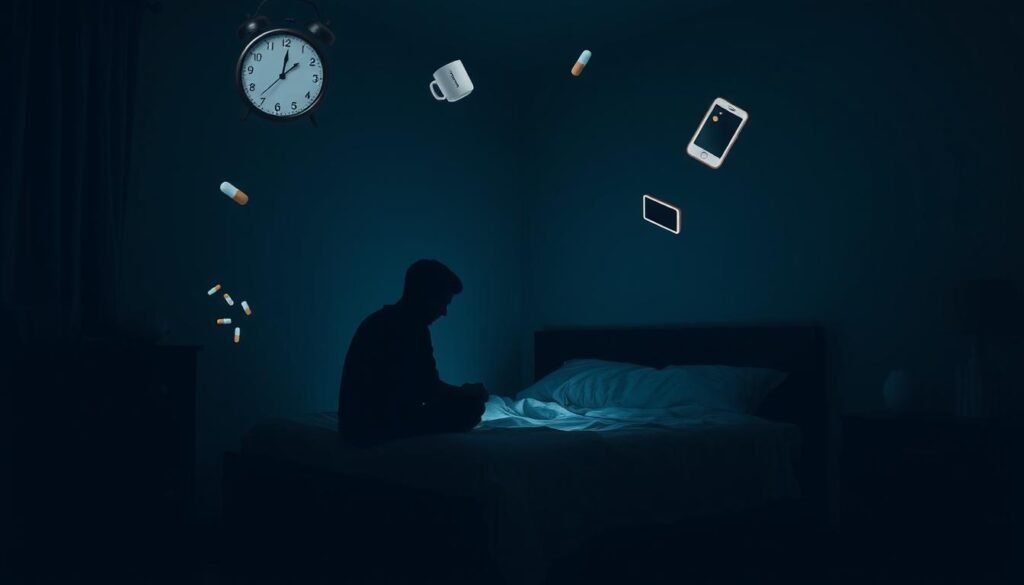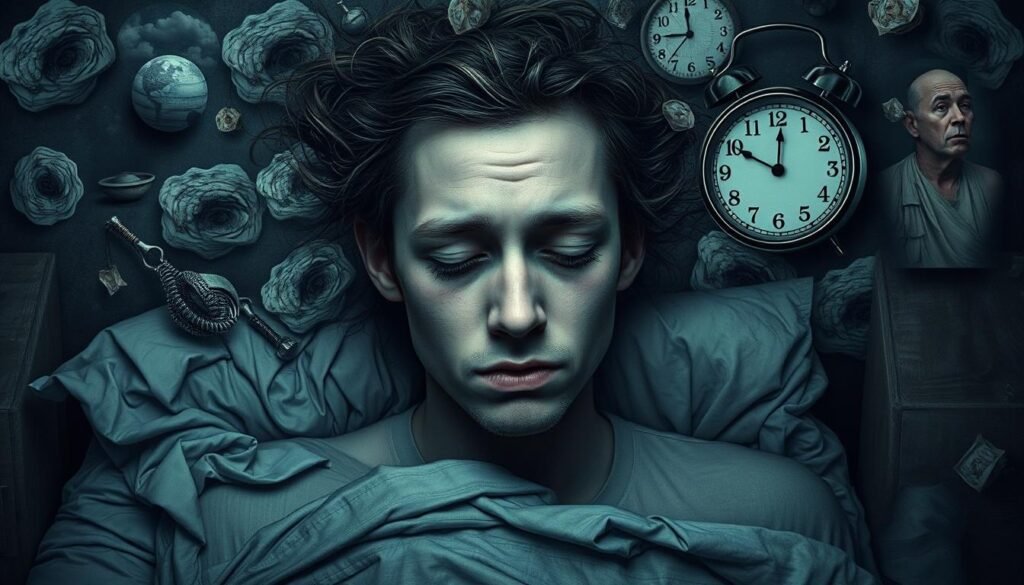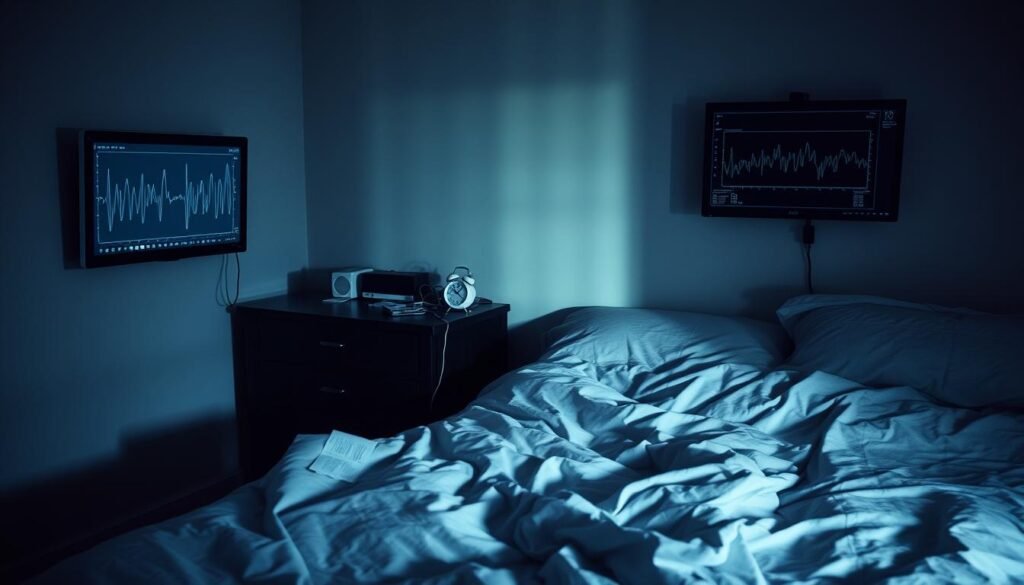Surprisingly, about 1 in 3 adults in the UK deal with insomnia for days or weeks. This shows how common this sleep disorder is. Insomnia means you have trouble falling or staying asleep, or you can’t sleep well. It can make you feel tired, affect your mood, and lower your life quality. Adults usually need 7 to 9 hours of sleep each night. But stress, anxiety, and where you sleep can mess with getting enough rest.
It’s important to understand insomnia and its causes. This knowledge helps those dealing with it, and their loved ones, find ways to sleep better. In this article, we’ll explore different types of insomnia, its symptoms, and how to treat it. Knowing more about insomnia helps people handle their sleep issues better.
Key Takeaways
- Insomnia affects approximately 1 in 3 people in the UK.
- Common causes of insomnia include stress, anxiety, and environmental factors.
- Chronic insomnia occurs when sleep issues happen more than 3 nights a week for over 3 months.
- More than 60% of people may experience insomnia symptoms at some point in their lives.
- Creating a comfortable sleep environment can improve sleep quality.
Understanding Insomnia
Insomnia is a common sleep disorder that stops people from sleeping well. It affects many people, making it hard to understand what is insomnia. This problem can mess with your sleep and your daily life.
Definition of Insomnia
Insomnia means you have trouble sleeping, wake up a lot, or wake up too early. It makes you tired, grumpy, and unable to think clearly. About 30% of adults face these issues sometimes.
Chronic insomnia lasts for months and affects 10% of adults. It hits women more due to changes in hormones. This shows how common insomnia is.
Prevalence and Impact
Insomnia does more than make you tired. Studies show 70% of sufferers have tried medicines, and 15% used benzodiazepines. It’s especially found in people over 60, where half struggle to sleep.
This situation leads to worse health and job problems. There’s also a link to serious problems like heart disease and diabetes. It could lead to a cycle of health issues, making it vital to recognize insomnia’s impact. For more details, check out this informative article.
What Is Insomnia and What Causes It
Insomnia is a common sleep problem that affects how well someone can live their daily life. It’s important to know the types of insomnia to find the right help. There are two main types: acute insomnia and chronic insomnia. They are different in how long they last and their causes.
Common Types of Insomnia
There are two main kinds of insomnia:
- Acute Insomnia: This short-term insomnia is often because of stress or big changes in life. It usually goes away in a few days or weeks.
- Chronic Insomnia: This type lasts a long time, often over three months. It might happen on its own or because of other health issues like anxiety or pain.
To figure out if someone has acute or chronic insomnia, it’s crucial to identify the type. This helps in choosing the best treatment. For more, see MedlinePlus on insomnia.
Chronic vs. Acute Insomnia
Knowing the difference between chronic and acute insomnia helps find the right treatment. Acute insomnia can get better on its own once the stress goes away. Yet, chronic insomnia might need more help, like therapy or medicine.
Stress, noise, and bad habits like too much caffeine or alcohol can cause both types. Making changes to these can help someone sleep better and feel better overall.
| Type of Insomnia | Duration | Common Causes |
|---|---|---|
| Acute Insomnia | Less than 3 months | Stress, life changes, anxiety |
| Chronic Insomnia | 3 months or longer | Medical conditions, anxiety, chronic pain |
Insomnia Symptoms
Understanding the signs of insomnia is key to helping someone get better. It affects both the body and mind. Knowing what to look for means you can find help sooner.
Physical Symptoms
Having trouble getting to sleep, waking up often, and getting up too early are common signs. People usually feel very tired during the day. Not sleeping well can also lead to serious health problems, like diabetes and high blood pressure.
If you want to know more about how not sleeping well can harm your body, there’s more information here.
| Physical Symptoms | Description |
|---|---|
| Trouble falling asleep | Struggling to initiate sleep, often resulting in frustration. |
| Frequent awakenings | Waking up multiple times during the night, disrupting sleep cycles. |
| Daytime fatigue | Experiencing tiredness and lack of energy throughout the day. |
| Waking up too early | Feeling the need to rise earlier than desired, impacting overall rest. |
Mental and Emotional Symptoms
Insomnia can make you feel more anxious, irritable, and make it hard to focus. It can make you feel down or upset, making sleep even harder. There’s a strong link between sleep and mental health.
Not sleeping well can start a cycle where emotional problems make sleep worse, and then poor sleep makes those problems bigger.
| Emotional Symptoms | Impact |
|---|---|
| Anxiety | Increased stress levels that further hinder the ability to sleep. |
| Irritability | Heightened sensitivity and mood swings affecting daily interactions. |
| Difficulty concentrating | Impaired cognitive functions making daily tasks challenging. |
| Lowered mood | Feelings of sadness or hopelessness influencing overall mental health. |
Risk Factors for Insomnia
Understanding who is more likely to get insomnia is important. Certain types of people, health issues, and ways of living increase the risk. These elements help us see how sleep health affects our daily lives.
Demographic Factors
Insomnia affects different groups in unique ways. Women suffer from it more than men, with up to double the cases. Elderly people also struggle, with half reporting symptoms. Moreover, those with less money or who work night shifts or travel often have higher insomnia rates.
Health Conditions
Conditions like diabetes, chronic pain, and breathing problems can make insomnia worse. About half of those with insomnia also face mental health issues like anxiety or depression. Problems such as sleep apnea and restless legs syndrome often go hand in hand with insomnia.
Lifestyle Choices
How we live greatly affects insomnia. Lack of exercise can lead to 40% of cases. Too much caffeine, alcohol, or smoking disrupts sleep. An erratic sleeping pattern and high stress can also harm sleep health.

| Factor Type | Specific Factors | Impact on Insomnia |
|---|---|---|
| Demographic | Gender, Age, Socioeconomic Status | Higher prevalence in women and older adults |
| Health Conditions | Chronic Pain, Psychiatric Disorders, Sleep Disorders | Exacerbation of sleep difficulties |
| Lifestyle Choices | Physical Activity, Substance Use, Sleep Hygiene | Direct correlation with sleep quality |
Causes of Insomnia
Understanding what causes insomnia is key. Many things lead to trouble sleeping, including life’s ups and downs and lifestyle choices. Stress from big emotions and thoughts is a big reason why some people can’t sleep well.
Stress and Life Events
Life’s tough spots, work stress, or big changes can ruin sleep. High anxiety makes your mind race at night, making it hard to sleep. Stressful events hit those harder who already struggle with sleep.
Poor Sleep Habits
Your daily habits are important for sleeping well. Things like not having a sleep schedule and too much screen time hurt sleep. To sleep better, it’s important to have good sleep habits.
Medical Conditions
Certain health issues also cause insomnia. For example, Type II diabetes can wake you up because of things like nerve pain. Also, about 20% of people have sleep apnea, which really messes with good sleep.
Substances that Disrupt Sleep
Some things you consume can mess up sleep. Caffeine and nicotine keep you awake longer. While alcohol might seem helpful, it actually makes sleep worse. Knowing this can help you sleep better.
| Cause | Description | Impact Level |
|---|---|---|
| Stress and Life Events | Emotional and mental strains leading to anxiety at night. | High |
| Poor Sleep Habits | Inconsistent schedules and screen usage near bedtime. | Moderate |
| Medical Conditions | Illnesses like diabetes and sleep apnea affecting sleep. | High |
| Substances | Intake of caffeine, nicotine, and alcohol disrupting sleep. | Moderate |
Effects of Sleep Deprivation
Sleep deprivation impacts our health in big ways. It harms our body and mind. Knowing this helps us value good sleep habits. Sleep deprivation has short-term and long-term effects. Both impact our daily life and overall health.
Short-term Effects
Short-term effects of insomnia show up fast. They can seriously affect us. People might face:
- Irritability that hurts personal and work life.
- Fatigue, making people feel tired and unproductive.
- Cognitive problems, like trouble with memory and focus.
- More stress, leading to emotional challenges.
- Appetite changes, which could cause bad eating habits.
Long-term Consequences
Ignoring insomnia can make health issues worse over time. Long-term sleep loss can cause:
- Higher risks of chronic diseases like high blood pressure and heart problems.
- More chance of getting Type 2 diabetes and obesity due to hormone issues.
- Weaker immune system, making it easier to get sick.
- Increased risk of mental health issues like anxiety and depression.
- Slower thinking, affecting learning and decision-making skills.

The more we ignore sleep problems, the worse the long-term effects get. It shows how vital sleep is. Realizing the severe outcomes makes it clearer why we must address sleep issues early.
Types of Insomnia
Insomnia comes in different forms, each impacting people in unique ways. Knowing these types can help find good treatments and improve sleep habits.
Acute Insomnia
Acute insomnia is short-term, lasting from three days to a few weeks. It’s often caused by stress, new surroundings, or discomfort. About 30% of people get it yearly.
The main signs are trouble falling asleep or waking up at night. Knowing it’s temporary can help people manage and find help.
Chronic Insomnia
Chronic insomnia happens three nights a week for three months or more. It usually links to other health or mental problems. More women than men get it.
Sufferers may find it hard to fall asleep, stay asleep, or may wake up too early. This can badly affect their day.
Secondary Insomnia
Secondary insomnia is due to other issues like anxiety, depression, or sleep apnea. Those with chronic insomnia often find it gets worse because of these problems.
Knowing what causes secondary insomnia helps in treating sleep better. For more info on insomnia types, visit this guide.
| Type of Insomnia | Duration | Common Triggers | Prevalence |
|---|---|---|---|
| Acute Insomnia | 3 days to 14 days | Stress, environmental changes | 30% annually |
| Chronic Insomnia | At least 3 nights/week for 3 months | Comorbid conditions, lifestyle factors | 10% of the population |
| Secondary Insomnia | Varies | Anxiety, depression, medical conditions | Common among those with chronic insomnia |
Insomnia Diagnosis and Evaluation
To find out if you have insomnia, doctors start by looking at your sleep and health closely. They talk to you to figure out how you sleep and what problems you’re having. Knowing exactly what’s going on helps doctors treat you right.
Medical History and Interviews
Doctors ask a lot of questions about how you sleep. They want to know:
- How long you’ve had trouble sleeping
- If it’s affecting your day
- Whether you’re dealing with other issues, like feeling down or anxious
- Any big changes in your life or stress that might be causing sleep problems
These talks help doctors a lot because about half of all Americans have insomnia. For 10 to 15% of them, it’s a big problem. Doctors try to figure out if someone’s insomnia is just for a little while or if it’s an ongoing issue.
Diagnostic Sleep Studies
If the talks suggest more info is needed, doctors might suggest a sleep study. These studies really show what’s happening while you sleep. They check things like:
| Metric | Description |
|---|---|
| Sleep Latency | Time taken to fall asleep, ideally less than 30 minutes |
| Number of Awakenings | Frequency and duration of nighttime awakenings |
| Sleep Efficiency | Percentage of time spent asleep while in bed, ideally above 85% |
| Total Sleep Time | Amount of sleep achieved, with less than 6.5 hours linked to early awakenings |
Doctors might also use tools like the Epworth Sleepiness Scale and the Insomnia Severity Index. These help them keep track of insomnia symptoms. Doing so helps in coming up with the best way to treat your insomnia.

Effective Treatments for Insomnia
Finding the best way to tackle insomnia can really change your life. There are many treatments available, like changing your lifestyle, trying cognitive behavioral therapy (CBT), or using medication. Knowing your options helps you take charge of your sleep.
Lifestyle Modifications
Changing your daily habits can make a big difference. It’s helpful to go to bed and wake up at the same time every day. A relaxing bedtime routine and a good sleeping environment are key. This means keeping your room dark, cool, and quiet.
Also, cutting down on screen time 30 minutes before sleep can help. This change alone can lead to better sleep.
Cognitive Behavioral Therapy (CBT)
CBT is a popular choice for treating insomnia without medication. It works by changing negative thoughts and learning how to relax. Research shows CBT can make sleep better for 75% of people with ongoing insomnia. It uses mental and behavior changes to lessen insomnia symptoms.
Medications and Sleep Aids
Medication can help in the short term, but it’s not the best long-term fix. Pills for sleep should be used carefully to avoid getting too dependent on them. Around 15-30% of people feel sleepy during the day from some of these drugs. Over-the-counter sleep aids, like antihistamines, can also make you drowsy the next day in many cases.
It’s important to find a good mix of treatments for the best results. This way, you can manage insomnia without relying too much on pills.
| Treatment Type | Effectiveness | Notes |
|---|---|---|
| Lifestyle Modifications | High | Improves sleep environment and routine; low-risk. |
| Cognitive Behavioral Therapy (CBT) | Very High | Targets root causes of insomnia; long-lasting effects. |
| Prescription Medications | Variable | Short-term relief; risk of dependency; side effects possible. |
| Non-Prescription Aids | Low to Moderate | Often cause daytime drowsiness; use recommended with caution. |
Find out more about different treatments here.
Conclusion
Insomnia affects about 30% of adults, disrupting their daily life. It’s linked to different factors, including age, gender, and other health conditions. There are many ways to tackle insomnia, from changing habits to getting professional help, all aiming to better life quality.
It’s key to understand insomnia’s types, signs, and root causes for effective management. Chronic insomnia can harm health, leading to higher medical costs and poorer life quality. Adopting better sleep habits and consulting doctors when needed can help people sleep well again.
For more insights on insomnia, resources like the insomnia summary are very helpful. Taking action on sleep problems can significantly boost health and productivity. This offers hope for a brighter and more rested future.